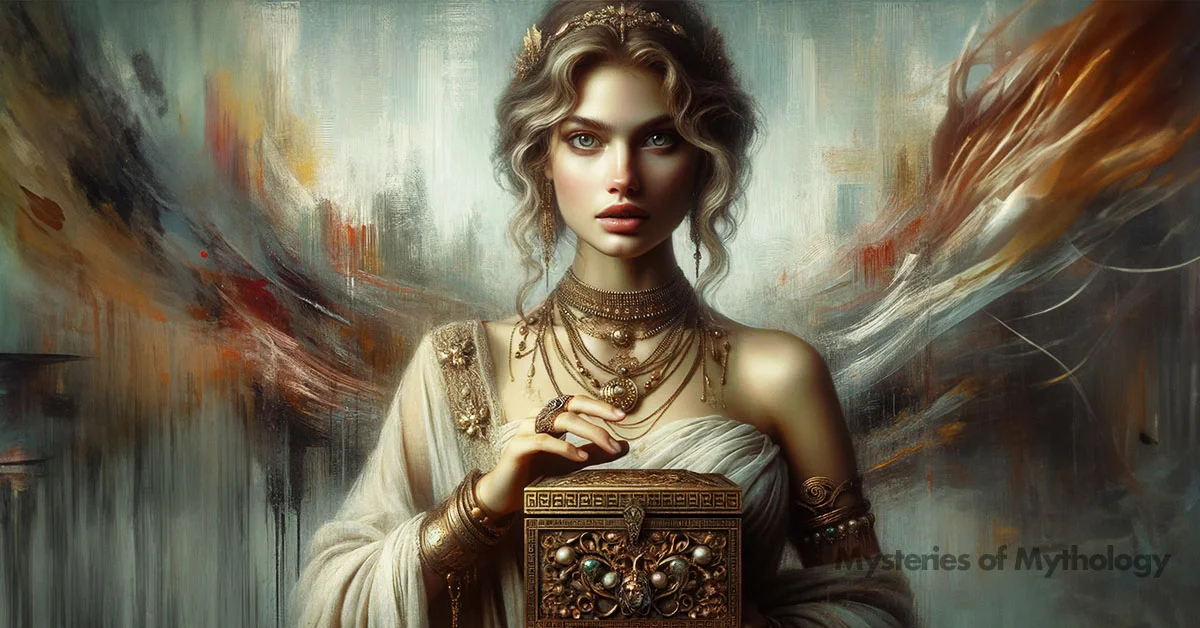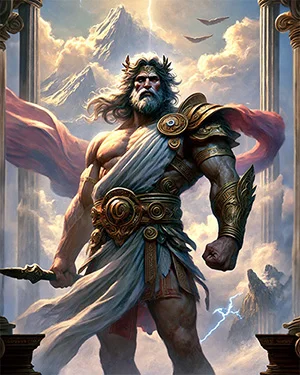Overview
Pandora was the first woman created in Greek mythology. Zeus wanted to punish the Titan Prometheus, who had stolen fire from the gods and given it to humans.
To carry out his plan, Zeus asked Hephaestus, the god of fire and crafts, to create Pandora from clay. All the other gods contributed to her creation by giving Pandora gifts like beauty and intelligence, but Hera gave Pandora curiosity.
Zeus then presented Pandora to Epimetheus, Prometheus’s foolish brother, as a wife. Despite Prometheus repeatedly warning his brother of Zeus’s gifts and advising him never to accept them, Epimetheus accepted Pandora as a bride.
As a wedding gift, Zeus gave Pandora a jar (pithos), often mistakenly referred to as ‘Pandora’s Box.’ Unable to resist her curiosity, Pandora opened the jar. It was filled with all the evils and miseries that would afflict humanity, such as sickness, death, and despair. However, one thing remained inside the jar—hope.
Want to know more? Read on…
Watch the related video
Etymology
The name “Pandora” comes from the Greek words “pan,” which means “all,” and “dōron,” which means “gift.” So, her name can be translated to “all-gifted” or “all-giving.” According to the poet Hesiod, Pandora was named this because, when she was created, every god on Mount Olympus gave her a special gift.
Pronunciation
ENGLISH
Pandora
GREEK
Πανδώρα (Pandōra)
PHONETIC
[pan-DAWR-uh]
IPA
/pænˈdɔr ə/
Attributes
Pandora is best known for the unique gifts and attributes given to her by the gods, each contributing to her purpose. Zeus ordered her creation as part of a plan to punish mortals (who, at the time, were only men). To make Pandora irresistible and intriguing, the gods gave her a variety of qualities:
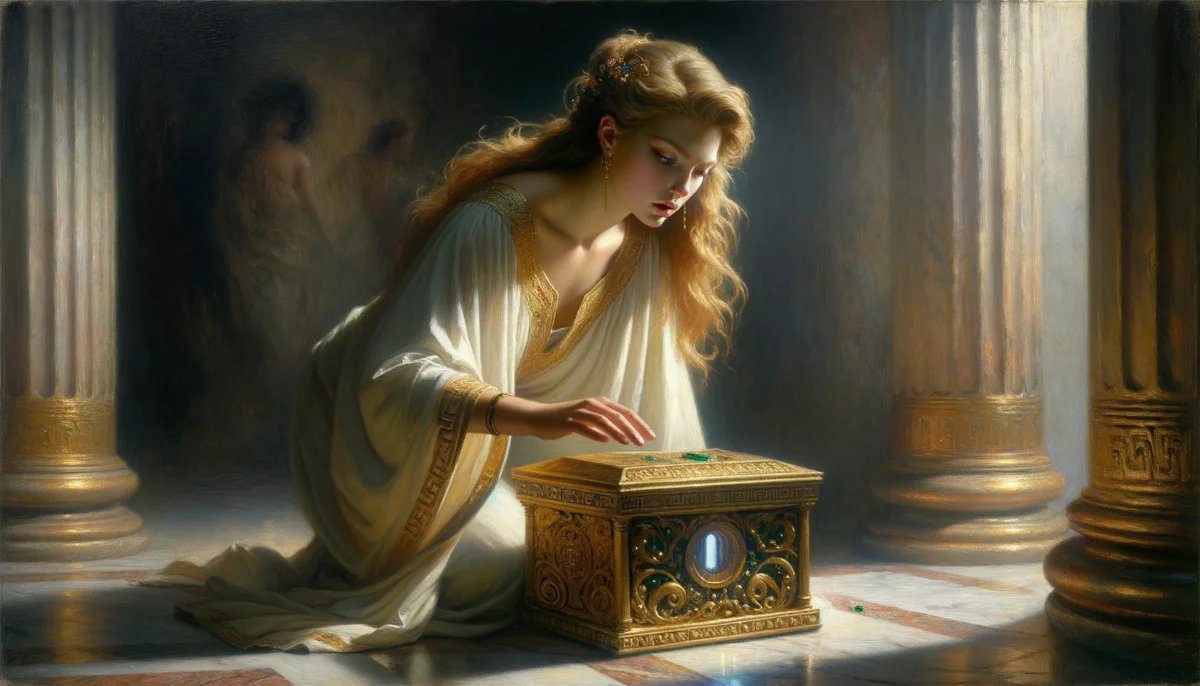
Gifts from the Gods
When Zeus ordered Pandora’s creation, he wanted her to be irresistible and intriguing to all men. Each god contributed to her creation, giving her different qualities.
- Hephaestus: As the god of fire and craftsmanship, Hephaestus moulded Pandora from clay and gave her life, making her stunningly beautiful.
- Aphrodite: The goddess of love and beauty gave Pandora grace and charm, ensuring that she would be appealing to all who saw her.
- Athena: The goddess of wisdom and war gifted Pandora with skills such as needlework and weaving, symbolising intelligence and domestic abilities.
- Hermes: The messenger god gave Pandora cunning and boldness, along with the ability to deceive, which would later play a role in the myth.
- Hera: Zeus’s wife, the goddess Hera, gave Pandora curiosity, which ultimately led to the opening of the jar.
“Hephaestus, at Zeus’ command, made a woman’s body from clay. Athena gave it life, and the rest of the gods each gave some other gift. Because of these gifts they named her Pandora [‘All-giving’].”
Hyginus Fabulae 142
Family
Pandora was created directly by the gods and did not have parents. She married Epimetheus, who was a Titan and the brother of Prometheus. Together, they had a daughter named Pyrrha, who was the first woman to be born naturally instead of being created like her mother.
Pyrrha’s story is even more interesting. She married her cousin Deucalion, whose father was Prometheus, Epimetheus’ brother. Pyrrha and Deucalion survived a massive flood that wiped out everyone else, and they became the ancestors of the new human race.
Family Tree
Consort
Husband
Epimetheus
Children
Daughter
Pyrrha
Mythology
Origins and Background: The Age of Gold
The story of Pandora starts far earlier than her creation, as early as the war between the Titans and the Olympians, the Titanomachy.
Not all of the Titans fought against Zeus. One who allied with Zeus and was important to this story was Prometheus, whose name is linked to ‘forethought’ and ‘planning ahead’.
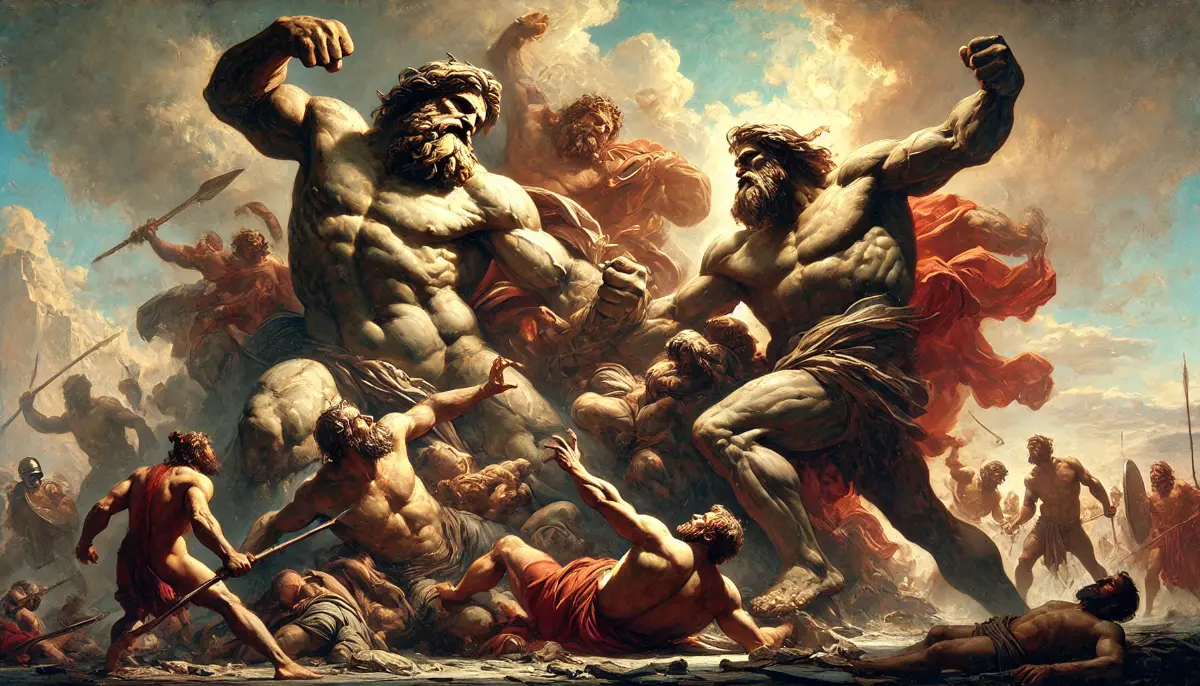
In the time when Zeus’s father, Cronos, ruled the cosmos, Prometheus had crafted man. As explained by Ovid in his ‘Metamorphoses’:
“He took the Rainwater, which has still something of the heavens, and mixed this with the earth into a creature never seen before. For, while the other animals look to the ground, this creature could turn its face to the stars, and see there his likeness in the gods who are Masters of all.”
Ovid, Metamorphoses
The first humans were exclusively male in what was called the ‘Age of Gold’.
“…they lived like gods without sorrow of heart, remote and free from toil and grief: miserable age rested not on them; but with legs and arms never failing they made merry with feasting beyond the reach of all evils. When they died, it was as though they were overcome with sleep, and they had all good things; for the fruitful earth unforced bare them fruit abundantly and without stint. They dwelt in ease and peace upon their lands with many good things, rich in flocks and loved by the blessed gods”
Hesiod, Theogony
Prometheus Trick
Prometheus wanted the best for his creations, but he understood that sacrifices needed to be made to the gods. So he prepared an ox for dinner and split it into two plates. He put the bones and gristle on one plate but covered it carefully with the roasted skin to look appetising. On the other plate, he put the best cuts of meat and hid them under an unappetising paunch. He then asked the great Zeus to take his pick; whichever plate was left would be given to humans.
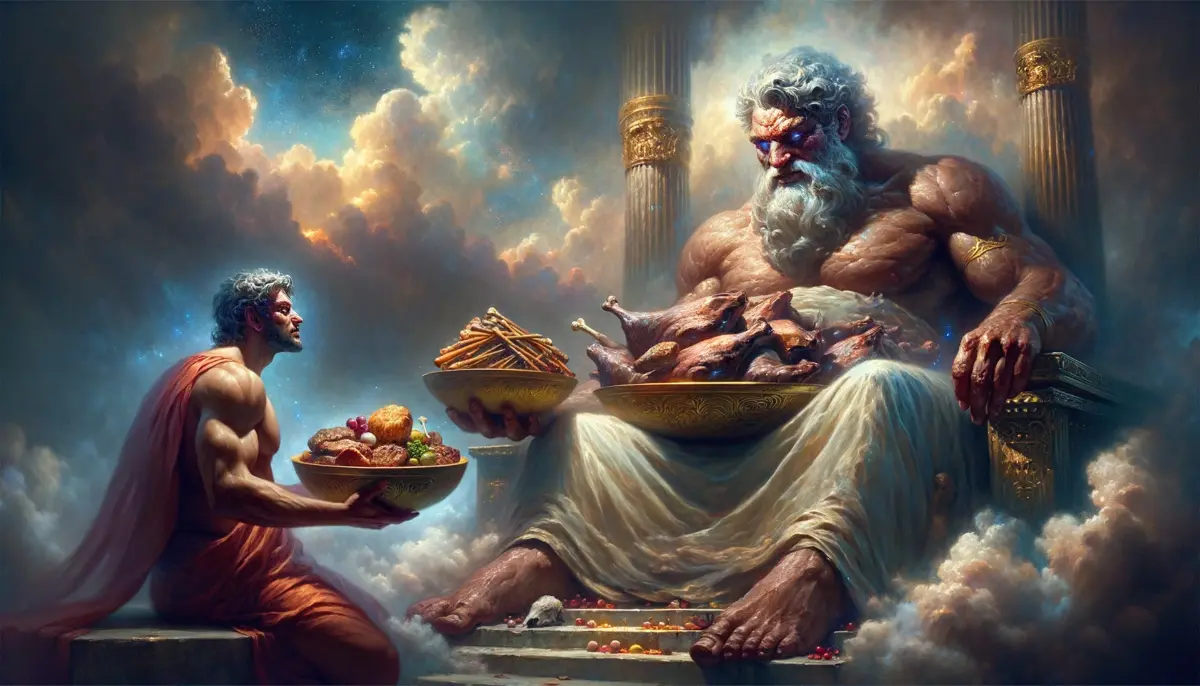
Zeus saw through the trick and was angered by Prometheus’s attempt. Nevertheless, He took the bones and gristle, and forever more, the gods would receive them when an animal was sacrificed.
Stealing Fire
To punish Prometheus for his trickery, Zeus decreed that humans would be denied the secret of fire, making them almost as primitive as the animals they lived with. But the stubborn Prometheus stole the fire back from the gods and returned it to humans.
Zeus was furious with Prometheus for his defiance and devised a severe punishment for him. He chained Prometheus to a great rock in the Caucasus mountains, where an eagle would swoop down and eat his liver each day. Because Prometheus was immortal, his liver would regenerate each night, and the torment would begin anew every day, trapping him in an endless cycle of agony.
However, Zeus also wanted to punish humanity, who had benefited from Prometheus’s actions.
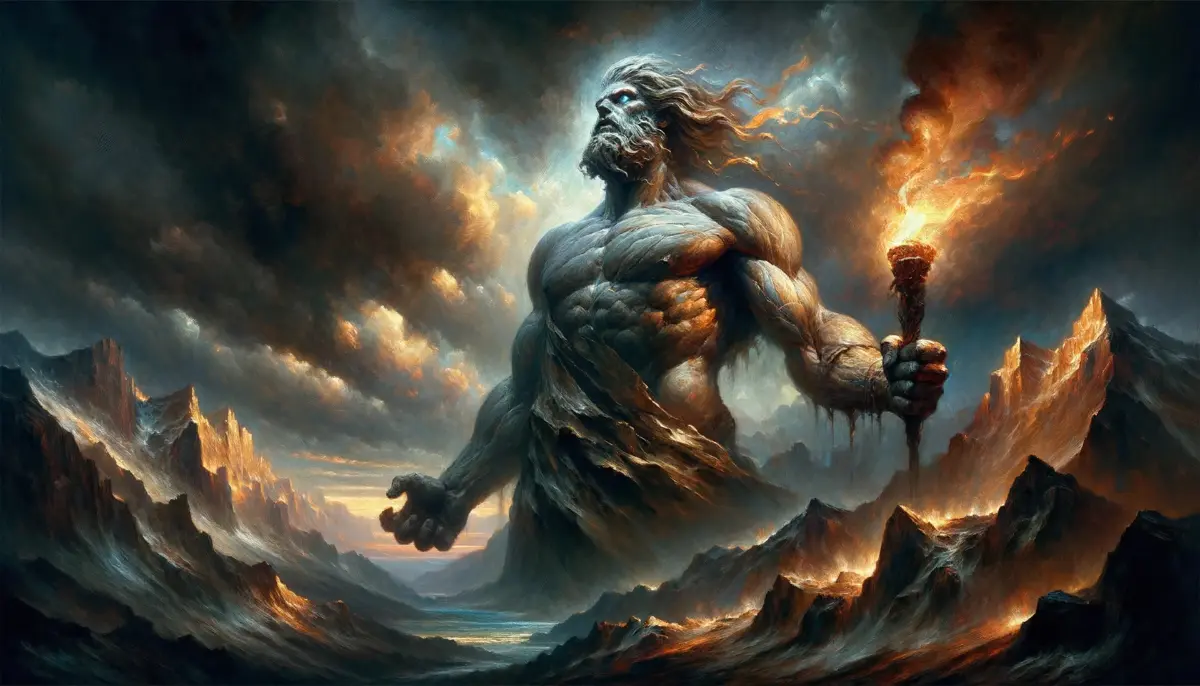
Hesiod’s Pandora: The Beautiful Evil
The most familiar version of Pandora’s myth comes from the ancient Greek poet Hesiod, particularly in his works Works and Days and Theogony.
“The gods keep hidden from men the means of life [i.e. fire] . . . Zeus in the anger of his heart hid it, because Prometheus the crafty deceived him; therefore he planned sorrow and mischief against men.
He hid fire; but that the noble son of Iapetos stole again for men from Zeus the counsellor in a hollow fennel-stalk, so that Zeus who delights in thunder did not see it. But afterwards Zeus who gathers the clouds said to him in anger: ‘Son of Iapetos, surpassing all in cunning, you are glad that you have outwitted me and stolen fire–a great plague to you yourself and to men that shall be. But I will give men as the price for fire an evil thing in which they may all be glad of heart while they embrace their own destruction.’”
Hesiod, Works and Days
Hephaestus, the god of fire and craftsmanship, moulded the first woman, Pandora, from clay. Other gods, such as Athena, Aphrodite, Hermes, the Graces, the Horae, and Peitho, gave her gifts and attributes, including beauty, charm, intelligence, and a touch of cunning.

Zeus then gave Pandora a large lidded jar, known as a pithos (often mistakenly referred to as a “box”), and sent her to Earth to be the bride of Epimetheus, Prometheus’s brother. Despite Prometheus’s warnings not to accept any gifts from Zeus, Epimetheus was enchanted by Pandora’s beauty and took her as his wife.
Eventually, Pandora’s curiosity got the better of her, and she opened the jar given to her by the gods. Out from it escaped all the evils of the world—sorrow, toil, disease, and despair—which quickly spread across humanity, ending their previously carefree existence. Realizing her mistake, Pandora managed to close the jar just in time to keep one thing inside: hope, known in Greek as Elpis.
Other Versions
While Hesiod’s version is the most well-known, there are other versions of her myth. Some versions suggest that Pandora’s jar was filled not with evils, but with good things like honesty, restraint, and grace. When she opened the jar, these positive qualities escaped and abandoned mankind, leaving only hope behind. Despite the difference in contents, the result was similar: the world was left with challenges and the promise of hope.
Interpretations
The Pandora myth has a couple of inconsistencies. One major issue is comparing Pandora’s supposed role as the first woman with other creation stories, such as Hesiod’s Ages of Man. This story describes the different groups of people that existed in various ages before Pandora’s time, which contradicts her supposed role as the first woman.
Another confusing aspect is the apparent duplication in Zeus’s punishment. Ancient Greek poets considered both Pandora herself (representing all women) and her jar of evils as separate punishments from Zeus. Considering the misogynistic attitudes of the time, in which women were already seen as troublesome, it’s unclear why the extra punishment of the jar was necessary.
The story’s portrayal of hope is also complicated. The Greek word “Elpis,” often translated as hope, has multiple meanings, such as expectation, belief, and anxiety. This ambiguity makes it challenging to understand hope’s role in the myth. If hope is seen as something positive, its presence in a jar of evils raises questions.
On the other hand, if it’s considered negative, then why didn’t it escape with the rest of the evils? Moreover, the idea of hope staying in the jar suggests that humans can’t have hope, which goes against common moral intuition.
A final argument is that hope was the real punishment. With hope, people endure their lives of illness and evil.
Pop Culture
The story of Pandora and her box is well-known in modern culture. It’s a symbol for unintended consequences and the relationship between curiosity and caution. This story continues to inspire many forms of art, from literature and film to music and visual arts.
Literature
Pandora’s story has been a rich source of inspiration for countless writers. The concept of “opening Pandora’s box” is frequently used in literature to describe characters who unintentionally unleash chaos or trouble. This metaphor captures the essence of unforeseen consequences that follow seemingly innocent actions. Notable works that reference Pandora include:
- “Pandora” by Anne Rice: This novel is part of Rice’s The Vampire Chronicles and explores themes of mystery and desire, reflecting the dual nature of Pandora’s myth.
- “Pandora’s Box” by Nathaniel Hawthorne: A short story that draws on the myth to explore human nature and moral lessons.
Film and Television
In film and television, the phrase “Pandora’s Box” is often used to signify a plot device where a character’s curiosity leads to unintended negative consequences. Movies and TV shows frequently draw on the myth’s themes of curiosity and consequence:
- “Pandora” (2016): A South Korean disaster film that uses the idea of Pandora’s box to explore the effects of a nuclear disaster and human resilience in the face of catastrophe.
- “Avatar” (2009): James Cameron’s blockbuster film features a planet named Pandora, symbolising the beauty and potential dangers of exploring the unknown.
Music
- “Pandora’s Box” by Aerosmith: A song that uses the metaphor of Pandora’s box to delve into themes of love and chaos.
- “Pandora” by Madeline Juno: This track captures the emotions associated with opening Pandora’s box, using the myth as a metaphor for personal growth and change.
Visual Arts
- “Pandora” by John William Waterhouse: A famous painting that portrays Pandora with an expression of curiosity and trepidation as she opens the box, capturing the myth’s dramatic essence.
Video Games
- “Pandora’s Tower”: A Japanese action RPG where the protagonist must overcome challenges related to the mysterious Pandora’s box.
- “God of War” series: Features Pandora and her box as central elements in the storyline, blending Greek mythology with epic adventure.
Frequently Asked Questions
What is the moral of the Pandora myth?
The moral of the Pandora myth is that curiosity can lead to unintended consequences, but even in difficult times, there is always hope.
Is Pandora evil or good?
Pandora is neither entirely evil nor entirely good. She is a complex figure representing the duality of human nature, embodying both positive qualities and the potential for causing harm.
Why did Zeus create Pandora?
Zeus created Pandora as a punishment for humanity after Prometheus gave them fire. She was designed to bring challenges and hardships to mortals.
What is the Greek legend of Pandora?
The Greek legend of Pandora tells of the first woman created by the gods, who was given a jar containing all the evils of the world. When Pandora’s curiosity led her to open the jar, these evils were released, leaving only hope inside.
What are the seven evils of Pandora?
The myth doesn’t specify exactly seven evils, but common interpretations include sickness, death, despair, greed, jealousy, hatred, and pain.
References
- Hyginus Fabulae 142
- Ovid, Metamorphoses
- Apollodorus, Library

